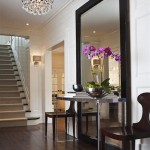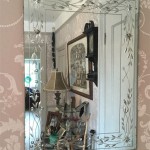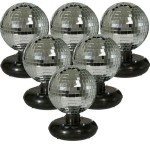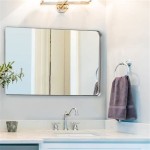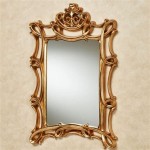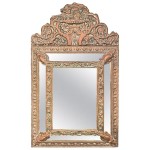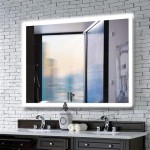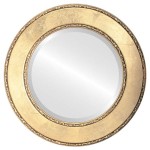Victorian Standing Mirror
The Victorian era, spanning the reign of Queen Victoria from 1837 to 1901, witnessed a flourishing of decorative arts. Furniture design, heavily influenced by historical revivalism and a burgeoning middle class, embraced ornate details and rich materials. Among the key pieces gracing Victorian homes, the standing mirror, also known as a cheval mirror or full-length mirror, held a prominent position, reflecting not only the owner's image but also the era's aesthetic sensibilities.
Victorian standing mirrors were more than mere functional objects; they were statements of style and status. Their designs often incorporated elements from various historical periods, including Gothic, Renaissance, and Rococo. This eclecticism resulted in mirrors featuring intricate carvings, elaborate moldings, and decorative embellishments. Popular motifs included floral garlands, scrolling acanthus leaves, cherubs, and classical figures.
The construction of these mirrors typically involved high-quality materials. Solid wood, such as mahogany, walnut, or rosewood, served as the foundation for the frame. The mirror plate itself, often backed with silver or mercury, provided a clear and undistorted reflection. Some mirrors incorporated beveled edges on the glass, adding a touch of sparkle and sophistication. Further enhancing their opulent appearance, some frames were gilded or inlaid with contrasting wood veneers, mother-of-pearl, or even semi-precious stones.
Different styles of Victorian standing mirrors catered to varying tastes and budgets. The cheval mirror, named for its resemblance to a horse (cheval in French), featured a freestanding frame supported by a pivoting base. This design allowed the user to adjust the angle of the mirror for optimal viewing. Other styles included rectangular or arched mirrors mounted on stands or incorporated into larger furniture pieces, such as wardrobes or dressing tables.
The size and placement of standing mirrors played a significant role in Victorian interiors. Large, imposing mirrors served as focal points in bedrooms and dressing rooms, adding grandeur to these spaces. Their reflective surfaces also helped to amplify natural light, brightening rooms that often relied on gas or candlelight. Smaller, more portable mirrors were sometimes placed on dressing tables or vanities for personal grooming.
Beyond their practical function, Victorian standing mirrors also reflected the social and cultural values of the era. The emphasis on ornate decoration and luxurious materials mirrored the Victorian fascination with display and social status. The presence of a large, beautifully crafted mirror in a home signaled prosperity and good taste. Additionally, mirrors played a role in the Victorian emphasis on personal appearance and self-fashioning. The ability to view oneself fully, from head to toe, became increasingly important with the rise of fashion and social etiquette.
Today, Victorian standing mirrors remain highly sought-after items among antique collectors and interior decorators. Their intricate designs, quality craftsmanship, and historical significance add a touch of timeless elegance to contemporary homes. Authentic Victorian mirrors can often be found at antique shops, auction houses, and online marketplaces. Reproductions, capturing the essence of Victorian design, are also available for those seeking the aesthetic without the antique price tag.
When evaluating a Victorian standing mirror, several factors contribute to its value and authenticity. The type of wood used in the frame, the quality of the carving, and the condition of the mirror plate are key considerations. Original silvered or mercury-backed mirrors may show signs of aging, such as foxing or discoloration, adding to their character. However, significant damage or repairs can detract from their value. Careful inspection of the frame for any signs of restoration or replacement parts is also recommended.
Incorporating a Victorian standing mirror into a modern interior can add a touch of historical charm and sophistication. Whether used as a functional piece in a bedroom or as a decorative accent in a living room or hallway, these mirrors serve as a reminder of the enduring appeal of Victorian design. Their presence can enhance a space, reflecting not only the owner's image but also a connection to a bygone era of elegance and craftsmanship.
The enduring popularity of Victorian standing mirrors speaks to their ability to transcend mere functionality and become objects of beauty and historical significance. They provide a glimpse into the aesthetic values of the Victorian era, a period marked by its fascination with ornamentation, craftsmanship, and the pursuit of refined living. These mirrors continue to capture the imagination of collectors and decorators alike, adding a touch of timeless elegance to homes both modern and traditional.

Victorian Floor Standing Mirror

Antique Victorian Carved Oak Free Standing Mirror For At Pamono

Victorian Mahogany Cheval Mirror Over 500 Pieces Antique Furniture

19th Century Victorian Giltwood Cheval Mirror On Stand With Caned Back For At 1stdibs Standing

Victorian Mahogany Cheval Mirror At 1stdibs Standing Antique Full Length

Victorian Style Cheval Mirror Coburg Hill Antiques

Victorian Mahogany Freestanding Cheval Mirror 1840s For At Pamono

Victoria Cheval Mirror Statue Com

Victorian Mahogany Freestanding Cheval Mirror 1840s Chairish
-3298-p.jpg?strip=all)
Victorian Cheval Mirror

